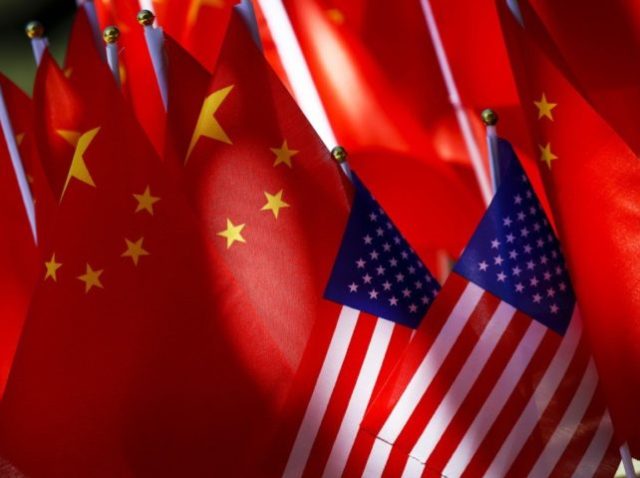China immediately denounced Tuesday’s unsealed U.S. indictment of ten Chinese agents for a five-year plot to steal aerospace technology as “sheer fiction and completely fabricated.”
The U.S. Justice Department promised those charges were just the beginning of a major pushback against intellectual property theft and made good on Thursday by filing charges against a state-owned Chinese firm for stealing technology from the largest memory chip maker in America, Micron Technology.
The new U.S. charges concern the Fujian Jinhua Integrated Circuit Company, which is embroiled in a legal battle with Micron. Micron accused Jinhua of conspiring with a Taiwanese company called UMC to hire away key Micron employees and encourage them to bring proprietary Micron technology with them. Micron further accused the Chinese government of issuing a temporary ban against sales of its products in China to retaliate against the company for suing Jinhua.
The U.S. Commerce Department announced export restrictions against Jinhua on Monday. On Thursday, the Justice Department followed up with criminal indictments against Jinhua, UMC, and three Taiwanese nationals for technology theft.
The Wall Street Journal saw the indictments as contributing to “a growing consensus that China is in violation of the 2015 bilateral pact between [Chinese Communist Party leader Xi Jinping] and then-President Obama on cybertheft,” although the Micron case does not involve hacking per se.
“U.S. intelligence officials and several private-sector cybersecurity firms believe the accord led to a real decline in Chinese espionage, but that the malicious activity has returned since Mr. Trump took office as hostilities over trade and other issues have escalated,” the Journal added.
Attorney General Jeff Sessions referenced Xi’s 2015 pledge to avoid cyberespionage on Thursday and said, “Obviously, that commitment has not been kept.” Sessions went on to announce a new working group of top Justice Department officials known as the “China initiative” that would work to counter Chinese infiltration of tech companies and universities.
China’s state-run Global Times was absolutely infuriated by the ten indictments revealed on Tuesday, running a spate of articles criticizing the United States and claiming it was using cybersecurity as a pretext to wage legal warfare against Chinese companies as a protectionist strategy.
On Wednesday, the Global Times quoted Chinese Foreign Ministry spokesman Lu Kang denouncing the indictments as “sheer fiction and completely fabricated.”
The article went on to quote Chinese analysts who said the indictment merely offered a “long narrative” without any supporting evidence and claimed China cannot make use of stolen American and European aerospace technology in any event because Chinese aircraft are somehow unique.
The Global Times then ran an editorial slamming the Justice Department’s allegations as part of an American “smear campaign against China” and pretended to be puzzled about why American authorities keep picking on the Chinese intelligence operation headquartered in Jiangsu province:
The US has made wrong accusations and hyped “Chinese spies” in the past. It has become Washington’s political and diplomatic measure to express its attitude toward Beijing.
Continuous US accusations against the Jiangsu security authorities are obviously coordinated with Washington’s policy adjustment toward China. This is a political action disguised as a judicial one.
The latest accusation is part of the campaign which also includes the US Department of Commerce’s decision to block China’s Fujian Jinhua from buying US components and high-ranking US officials’ claims that there are many spies among Chinese students in the US, slandering China for infringing US intellectual property rights. The US is promoting political mobilization against China and so pressuring Beijing.
The Global Times also portrayed the hotly disputed Bloomberg News expose of Chinese spy chips implanted on motherboards sold in the United States as collusion between the Trump administration and the media to create “a false impression that the Chinese government is organizing commercial espionage against the U.S.”
“Those radical US elites arrogantly believe that China stole its modernization from the US and every Chinese person looks like a spy to them,” the Global Times fulminated. “As China and the US share a wide and complicated exchange, such extreme thinking is harmful. It not only hurts the two countries’ normal exchanges but also threatens the safety of innocent people and leads to miscarriages of justice.”
The Chinese paper suggested China’s intelligence apparatus should retaliate by exposing U.S. espionage in China to “let the world see U.S. spies’ behavior.”
On Thursday, the Global Times claimed the world is closing ranks around Beijing to thwart President Donald Trump’s “unilateralism to try to alter the international trade system,” in particular his withdrawal from the Iran nuclear deal and the tough sanctions about to take effect against Iran.
The Times speculated that even China’s longtime regional rivals India and Japan will realign themselves toward Beijing if the Trump administration does not grant them exemptions from Iran sanctions. It portrayed Japanese Prime Minister Shinzo Abe’s recent visit to China as the Japanese leader coming with hat in hand to beg the Chinese to forgive his “anti-China campaigns, including a key role in the Obama administration’s pivot to Asia strategy and worldwide bluster for direct competition with Chinese overseas infrastructure investment.”
In other words, the Global Times asserted Abe has realized Japanese competition with China’s Belt and Road infrastructure project is futile and predicted India will get with the program as well.
“An unpredictable Trump administration is changing the perception of threat of major powers. To countries that are friendly to the US, an obvious source of threat is China, because they worry that a rising China would change the status quo. But now Trump has smacked them right in the face when his foreign policies have changed the status quo thoroughly to cause collateral damage, or worse, direct damage. India and Japan won’t be the last ones, more states will choose to soft-balance the U.S.,” the Global Times concluded.

COMMENTS
Please let us know if you're having issues with commenting.